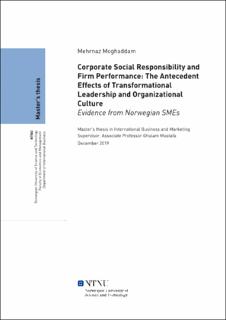| dc.description.abstract | Purpose: There has been growing consideration regarding corporate social responsibility (CSR) in recent years, and a lot of research has accumulated on this topic. Much of the existing studies have, however, focused on large firms, and there is still a dearth of research about what factors nurture CSR practices in SMEs and how such practices are related to their non-financial performance (NFP). Using a sample of Norwegian SMEs, this study examined the relationship between CSR and NFP. The study further examined whether transformational leadership (TFL) and organizational culture act as antecedents in promoting CSR practices.
Design/methodology/approach: Methodology included a combination of quantitative and qualitative approaches using a survey instrument and semi-structured interviews. However, the quantitative approach was used as the primary method of the study. Quantitative data were collected from 84 Norwegian SMEs through a questionnaire survey, while qualitative data comprised face to face interviews of three participants. Exploratory factor analysis was applied to validate the scales used to measure the study constructs. To measure CSR, a composite measure comprising four dimensions (CSR employees, CSR customers, CSR community, and CSR natural environment) was used. To assess organizational culture (clan, hierarchy, market, adhocracy), the Competing Value Framework (CVF) model was used. TFL was measured as a single construct by combining its four dimensions (idealized influence, inspirational motivation, intellectual stimulation, and individualized consideration). Data were then analyzed using the structural equation modeling (SEM) technique.
Findings: The findings indicate that CSR significantly affects SME’s NFP. This suggests that socially responsible business practices towards primary stakeholders can be profitable and beneficial to Norwegian SMEs. TFL was found to have a significant positive relationship with CSR practices. Besides, among different types of organizational culture, only adhocracy culture showed a significant positive relationship with CSR, whereas clan and market culture had a positive but insignificant relationship with CSR. | |
